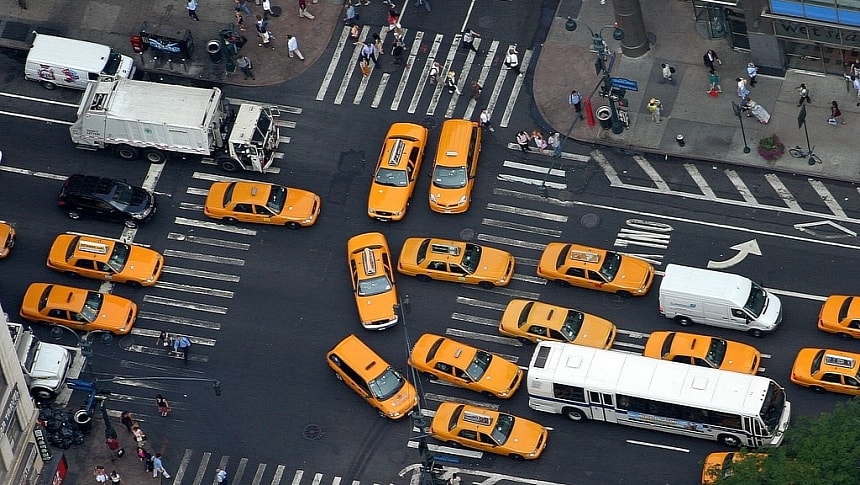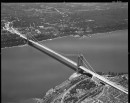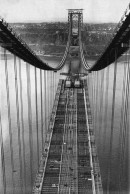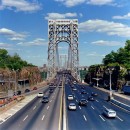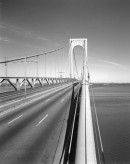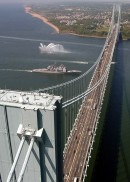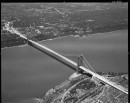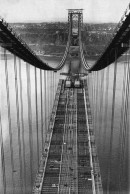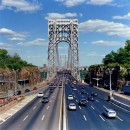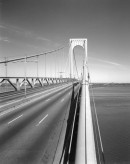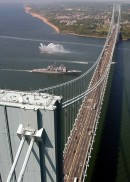Welp, it happened, folks. After months of public belly-aching and enough grassroots litigation to fill a law textbook, New York City's plan to implement London and Paris-style congestion charging in the most highly traffic-ridden portions of Manhattan's Central Business District is now, for the moment, dead in its tracks. Via an official decree from New York's Governor Kathy Hochul, the indefinite pushback of a program set to charge New Yorkers $15 at peak hours to drive from 60th Street south through Manhattan is being met with praise by some, but not by all.
Depending on which side of the pro-auto vs. anti-auto side of the New York City paradigm you stand on, you might even be angry the congestion charge program isn't coming as expected. For the kind of people who stand antithetical to motor vehicles clogging up major cities, the furlough of Manhattan's congestion charging plans is a travesty, a total affront to everything they hold dear regarding how they'd like their city to run. There's a definite polarization in the air about whether axing congestion charging is "le good" or "le bad." But let's do our best with a mix of facts, figures, and a little bit of personal insight to break down both sides.
Now, for some context, it's highly recommended you check out our last editorial on NYC's proposed congestion charging scheme and some of its negative feedback, particularly from rideshare workers, delivery drivers, and contractors most likely to be adversely impacted financially by congestion charging and another spike in bridge tolls across New York and New Jersey by another $0.63 per trip in January 2024. Those who find these road travel price hikes disproportionately affected working-class commuters rather took particular offense to the idea of European-style congestion charging in Manhattan.
With a cost of living crisis hitting the city quite unlike any before it in its intensity, one shudders to imagine what congestion honest-working cabbies and contractors living in Manhattan's satellite who travel in for work every day might do for their day-to-day financial health. But as some of the comments on that last item prove, not everyone feels this way. In fact, some New Yorkers seem to harbor outright contempt for the motor vehicle.
"You don’t need a car to live in NYC. I’ve never owned one," one comment read. "Why do you [auto commuters] have a right to subsidized travel at every other taxpayers expense? Because that's what you get now. All this is doing is making it a little more fair for people who don't drive," another comment said. "No one "needs" altogether to use their car in central Manhattan. That's just not true, and it detracts from your points to make claims like that."
Jeez, tell us how you really feel about it, why don't you. But in fairness, these people might have a point, apart from all forms of transportation being publicly subsidized to one degree or another. Indeed, New York City is one of a handful in the world that claims the trifecta of sprawling networks of highways, a robust high-capacity commuter rail service, and immediate access to three of the highest-traffic airports in the world, all within a relatively compact stretch of land. People can and do go their entire lives, never even once touching the steering wheel of a car in cities like Philadelphia, Chicago, Boston, Washington DC, and, of course, New York.
In a city where maintaining a parking spot can run as much as the rent in flyover states, is there any ethical or pragmatic benefit to driving for any length of time in a space that many argue is better used for bike paths and public parks? Well, in a perfect world, that'd be where most would call checkmate. But as anyone who follows Cash Jordan on YouTube or bothers to watch the news these days will tell you, New York City is so far removed from perfect it might as well not be in the observable universe. Take the Subway, for example.
All one has to do to understand why arriving alive at your NYC Subway destination isn't always guaranteed is to watch the news at any point in the last five years. Stories and TikTok videos abound depicting fights, beatings, muggings, stabbings, slashings, shootings, pickpocketings, and general crackhead behavior occurring at dozens of New York's busiest subway stations. From the 1 train to the N train to the 7 train and across each of the city's 36 subway lines, it seems every New Yorker knows someone involved in some form of subway tomfoolery. In some tragic cases, people wind up dead at the end of it all. As for an MTA city bus? There are born and bread Manhattanites who wretch at the thought of riding one; that alone should speak for itself.
So then, with pedestrian nightmare traffic-ridden streets above and dangerous, rat-infested, ill-protected subways down below, it sort of feels like New Yorkers get the short end of the stick regardless of what side of the congestion charging debate you happen to be. Therein lies the problem with congestion charges in Lower Manhattan, regardless of what side of the aisle you come from. Yes, the practice would, in theory, drastically lower vehicle traffic around Manhattan's most vital financial and cultural institutions.
You might even get the "You'd be happier on a bike" type crowd excited by the notion. More space for pop-up cafes and boutiques, or to ride your several thousand dollar bicycle around in form-fitting lycra suits? What could be wrong with that? But at the expense of people who need to drive through lower Manhattan for one reason or another? Now, that's a proposition that a locale so dependent on passenger cars everywhere else but Manhattan can't stomach so easily. 80 years of predatory urban planning in favor of motor vehicles and against public transportation isn't going to go away because a few pencil pushers and bean counters thought congestion charging would magically fix everything.
In short, there has to be a solution out there that encourages New Yorkers to use public transport again instead of driving. You could start by, oh, I don't know, having police watch over subway stations at all hours of the day instead of renting robots from a shady security firm to do it instead. You could expand subway lines into portions of Queens, Brooklyn, and the Bronx that were previously far off from the nearest rail station to have them forgo rideshare apps or even car ownership altogether. Heck, you could even slap a few train stations in the medians of highways leading into and out of the city like cities like Chicago have already done.
Of course, any of that would involve sound investment strategies and competent political leadership, which seems to be void in New York City politics as of late. It's easier to stick the working man or woman with the bill every time they cross a bridge or tunnel into New York City and every time they dare venture south of 60th Street than set a plan that solves the root causes of why this area swells up with auto traffic almost perpetually. As we said in our last editorial, there are brilliantly talented urban planners and civil engineers graduating from American universities right now up to maintaining a world-class highway system and an uber-busy commuter rail network simultaneously.
At no point in the last 25 years have both paradigms been sufficiently funded at the same time. Can you imagine how conditions might improve if someone without a bank account in their skull where their brain should be took charge? Then again, maybe that's just more wishful thinking from someone who longs for the days when New Yorkers solved problems and built grand machines instead of bickering in a culture war that no side can ever truly win. Call me a bleeding heart, but thems is the facts.
Now, for some context, it's highly recommended you check out our last editorial on NYC's proposed congestion charging scheme and some of its negative feedback, particularly from rideshare workers, delivery drivers, and contractors most likely to be adversely impacted financially by congestion charging and another spike in bridge tolls across New York and New Jersey by another $0.63 per trip in January 2024. Those who find these road travel price hikes disproportionately affected working-class commuters rather took particular offense to the idea of European-style congestion charging in Manhattan.
With a cost of living crisis hitting the city quite unlike any before it in its intensity, one shudders to imagine what congestion honest-working cabbies and contractors living in Manhattan's satellite who travel in for work every day might do for their day-to-day financial health. But as some of the comments on that last item prove, not everyone feels this way. In fact, some New Yorkers seem to harbor outright contempt for the motor vehicle.
"You don’t need a car to live in NYC. I’ve never owned one," one comment read. "Why do you [auto commuters] have a right to subsidized travel at every other taxpayers expense? Because that's what you get now. All this is doing is making it a little more fair for people who don't drive," another comment said. "No one "needs" altogether to use their car in central Manhattan. That's just not true, and it detracts from your points to make claims like that."
Jeez, tell us how you really feel about it, why don't you. But in fairness, these people might have a point, apart from all forms of transportation being publicly subsidized to one degree or another. Indeed, New York City is one of a handful in the world that claims the trifecta of sprawling networks of highways, a robust high-capacity commuter rail service, and immediate access to three of the highest-traffic airports in the world, all within a relatively compact stretch of land. People can and do go their entire lives, never even once touching the steering wheel of a car in cities like Philadelphia, Chicago, Boston, Washington DC, and, of course, New York.
In a city where maintaining a parking spot can run as much as the rent in flyover states, is there any ethical or pragmatic benefit to driving for any length of time in a space that many argue is better used for bike paths and public parks? Well, in a perfect world, that'd be where most would call checkmate. But as anyone who follows Cash Jordan on YouTube or bothers to watch the news these days will tell you, New York City is so far removed from perfect it might as well not be in the observable universe. Take the Subway, for example.
All one has to do to understand why arriving alive at your NYC Subway destination isn't always guaranteed is to watch the news at any point in the last five years. Stories and TikTok videos abound depicting fights, beatings, muggings, stabbings, slashings, shootings, pickpocketings, and general crackhead behavior occurring at dozens of New York's busiest subway stations. From the 1 train to the N train to the 7 train and across each of the city's 36 subway lines, it seems every New Yorker knows someone involved in some form of subway tomfoolery. In some tragic cases, people wind up dead at the end of it all. As for an MTA city bus? There are born and bread Manhattanites who wretch at the thought of riding one; that alone should speak for itself.
So then, with pedestrian nightmare traffic-ridden streets above and dangerous, rat-infested, ill-protected subways down below, it sort of feels like New Yorkers get the short end of the stick regardless of what side of the congestion charging debate you happen to be. Therein lies the problem with congestion charges in Lower Manhattan, regardless of what side of the aisle you come from. Yes, the practice would, in theory, drastically lower vehicle traffic around Manhattan's most vital financial and cultural institutions.
You might even get the "You'd be happier on a bike" type crowd excited by the notion. More space for pop-up cafes and boutiques, or to ride your several thousand dollar bicycle around in form-fitting lycra suits? What could be wrong with that? But at the expense of people who need to drive through lower Manhattan for one reason or another? Now, that's a proposition that a locale so dependent on passenger cars everywhere else but Manhattan can't stomach so easily. 80 years of predatory urban planning in favor of motor vehicles and against public transportation isn't going to go away because a few pencil pushers and bean counters thought congestion charging would magically fix everything.
In short, there has to be a solution out there that encourages New Yorkers to use public transport again instead of driving. You could start by, oh, I don't know, having police watch over subway stations at all hours of the day instead of renting robots from a shady security firm to do it instead. You could expand subway lines into portions of Queens, Brooklyn, and the Bronx that were previously far off from the nearest rail station to have them forgo rideshare apps or even car ownership altogether. Heck, you could even slap a few train stations in the medians of highways leading into and out of the city like cities like Chicago have already done.
Of course, any of that would involve sound investment strategies and competent political leadership, which seems to be void in New York City politics as of late. It's easier to stick the working man or woman with the bill every time they cross a bridge or tunnel into New York City and every time they dare venture south of 60th Street than set a plan that solves the root causes of why this area swells up with auto traffic almost perpetually. As we said in our last editorial, there are brilliantly talented urban planners and civil engineers graduating from American universities right now up to maintaining a world-class highway system and an uber-busy commuter rail network simultaneously.
At no point in the last 25 years have both paradigms been sufficiently funded at the same time. Can you imagine how conditions might improve if someone without a bank account in their skull where their brain should be took charge? Then again, maybe that's just more wishful thinking from someone who longs for the days when New Yorkers solved problems and built grand machines instead of bickering in a culture war that no side can ever truly win. Call me a bleeding heart, but thems is the facts.
